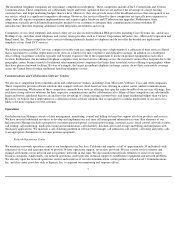8x8 2014 Annual Report Download - page 21
Download and view the complete annual report
Please find page 21 of the 2014 8x8 annual report below. You can navigate through the pages in the report by either clicking on the pages listed below, or by using the keyword search tool below to find specific information within the annual report.
be construed in a manner that imposes unanticipated conditions or restrictions on our ability to provide our platform to our customers, content
creators and brand advertisers. In the future, we could be required to seek licenses from third parties in order to continue offering our platform,
which licenses may not be available on terms that are acceptable to us, or at all. Alternatively, we may need to re-engineer our platform or
discontinue use of portions of the functionality provided by our platform. In addition, the terms of open source software licenses may require us
to provide software that we develop using such software to others on unfavorable license terms. Our inability to use third party software could
result in disruptions to our business, or delays in the development of future offerings or enhancements of existing offerings, which could impair
our business.
Our business depends on continued, unimpeded access to the Internet by us and our users, but Internet access providers and Internet
backbone providers may be able to block, degrade or charge for access to or bandwidth use of certain of our products and services,
which could lead to additional expenses and the loss of users.
Our products and services depend on the ability of our users to access the Internet, and certain of our products require significant bandwidth to
work effectively. In addition, users who access our services and applications through mobile devices, such as smartphones and tablets, must have
a high-speed connection, such as Wi-Fi, 3G, 4G or LTE, to use our services and applications. Currently, this access is provided by companies
that have significant and increasing market power in the broadband and Internet access marketplace, including incumbent telephone companies,
cable companies and mobile communications companies. Some of these providers offer products and services that directly compete with our
own offerings, which give them a significant competitive advantage. Some of these providers have stated that they may take measures that could
degrade, disrupt or increase the cost of user access to certain of our products by restricting or prohibiting the use of their infrastructure to support
or facilitate our offerings, or by charging increased fees to us or our users to provide our offerings, while others, including some of the largest
providers of broadband Internet access services, have committed to not engaging in such behavior. These providers have the ability generally to
increase their rates, which may effectively increase the cost to our customers of using our cloud communications and collaboration services.
On January 14, 2014, the United States Court of Appeals for the District of Columbia Circuit vacated and remanded part of the Commission's
Open Internet rules. Subsequently, on May 15, 2014, the Federal Communications Commission or FCC released a Notice of Proposed
Rulemaking to consider new rules. We cannot predict the outcome of this rulemaking or predict whether any new rules will be subject to a legal
appeal. Although we believe interference with access to our products and services is unlikely, broadband Internet access provider interference
has occurred in limited circumstances in the United States and could result in a loss of existing users and increased costs, and could impair our
ability to attract new users, thereby negatively impacting our revenue and growth.
Vulnerabilities to security breaches, cyber intrusions and other malicious acts could adversely impact our business.
Our operations depend on our ability to protect our network from interruption by damage from unauthorized entry, computer viruses or other
events beyond our control. In the past, we may have been subject to denial or disruption of service, or DDOS, attacks by hackers intent on
bringing down our services, and we may be subject to DDOS attacks in the future. We cannot assure you that our backup systems, regular data
backups, security protocols, DDOS mitigation and other procedures that are currently in place, or that may be in place in the future, will be
adequate to prevent significant damage, system failure or data loss.
Critical to our provision of service is the storage, processing, and transmission of confidential and sensitive data. We store, process and transmit
a wide variety of confidential and sensitive information including credit card, bank account and other financial information, proprietary, trade
secret or other data that may be protected by intellectual property laws, customers' and employees' personally identifiable information, as well as
other sensitive information. We, along with others in the industry, will be subject to cyber threats and security breaches, either by third parties or
employees, given the nature of the information we store, process and transmit. Our continued ability to securely store, process and transmit data
is essential to our business.
We are aware of the risks associated with cyber threats and we have implemented a number of measures to protect ourselves from cyber attacks.
Specifically, we have redundant servers such that if we suffer equipment or software failures in one location or on one set of servers, we have the
ability to provide continuity of service. We actively monitor our network for cyber threats and implement protective measures periodically. We
conduct vulnerability assessments and penetration testing and engage in remedial action based on such assessments. Depending on the evolving
nature of cyber threats and the measures we may have to implement to continue to maintain the security of our networks and data, our
profitability may be adversely be impacted or we may have to increase the price of our services that may make our offerings less competitive
with other communications providers.
17
























